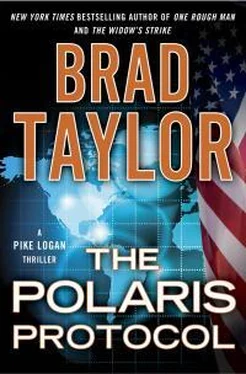He consciously focused on the goal of stopping the United States’ injustice the world over, but he couldn’t keep another nagging thought from intruding: If it failed, he’d get no money at all. No way to pay off his drug debts. No way to escape.
Then he thought about the man receiving the protocol. Carlos. If POLARIS didn’t work, money would be the least of his problems. Maybe Booth should stay here. Just call it a day. Why go to Mexico and risk the wrath of someone like Carlos?
But that outcome was predicated on POLARIS’s failure. Something he could test right now. If POLARIS executed like he’d programmed, it would be worth a great deal of money. And he was the only one who could make it function. Carlos could threaten, but he needed Booth’s help. If the thing worked.
After checking in, he’d sat on the bed and contemplated a test.
It was a risk, because the disruption would definitely be felt, causing the 2nd SOPS and Boeing to go crazy trying to figure out what had happened, but that, in itself, was worth the test. He’d buried the protocol deep, cloaking it with the GPS constellation’s own code, making it impossible to find without shredding the software that gave the satellite life. This would force them to clean the satellites one by one to prevent interruption of the overall constellation, a massive, time-consuming process. In the end, a doppelgänger of Booth would root around, trying to locate what had caused the issue, but he would have little luck finding the protocol if he didn’t know where to look.
Theoretically.
His GPS gave a little beep, and he saw an icon of a Volkswagen Beetle centered directly over his hotel, blinking silently. On, off. On, off. Beckoning. Booth made up his mind.
He plugged the other GPS into the computer and waited for it to mate to the protocol. The GPS satellites were continuously circling the earth, and he needed to know which ones were overhead in order to only affect North America. It was a bit of a technological marvel that the average person took for granted when cursing their GPS, but the satellites broadcast an almanac of locational data that the little receiver then synchronized before searching the sky for the strongest signal.
He saw a string of numbers, labeled SVN 54, SVN 67, SVN 32, and continuing until all operational satellites were listed. He now knew the location of every one, and POLARIS synchronized the data. He turned to the laptop, engaging the “equalizer” button for North America but leaving the others alone.
He touched the “volume” dial until it showed six seconds, the timing packet used by the 2nd SOPS when working the constellation. His mouse icon hovering over the tuning dial, he debated on the degree of timing offset. He had no idea how effective his protocol was and wanted to be able to register a disruption with his crude little handheld GPS, so he went ahead and dialed it all the way to the right.
He connected to the Wi-Fi in his room, logging on to the Internet, then pulled up Tor, a browser package that utilized a volunteer network of computers that would randomize his ISP, preventing a searcher from knowing who he was or what he had sent over the Internet. He smiled at the irony of using something developed for the military to cloak his attack against that same body.
Once his computer had accessed the Boeing desktop in his little frigid trailer, he stroked the keys, turning off the Boeing firewall. Everything set, his mouse icon hovered over the power button to the virtual stereo deck. He glanced once more at the second GPS sitting in the window, seeing the car still blinking in the correct spot. He clicked “on.”
The little GPS blinked, then flashed the message, “Acquiring Satellites.” Two seconds later, it showed his location as somewhere in northern Canada. Two seconds after that, it went through the same process again, the icon ending up back at his hotel.
*
A quarter of a mile away, at the 7-Eleven on Tower Road, a man attempting to buy gas for his rental car received the message “Unable to complete transaction” from the fuel pump. He ran into the store to pay, dismayed at the line. He waited at the end, glancing at his watch every five seconds, growing more and more frustrated. The line didn’t move as the cashier tried to get her machines to function. He felt the time slip by and wondered if he would make his flight. He needn’t have worried.
*
On I-70, a mother desperately trying to reach the airport before her plane left heard her GPS say, “Recalculating.” Shoving a pacifier into her crying baby’s mouth, she unwittingly drove past her exit while it bounced back and forth. Seven seconds later, when it finished calculating, it ordered a U-turn, causing her to scream in frustration. She prayed her aircraft was delayed. Her prayer would be answered.
*
In the control tower of Denver International Airport, the largest airport in the United States by area and the fifth busiest by volume, the air-traffic controllers were hard at work synchronizing a dizzying array of fuel-laden flying bombs.
One of the first airports to be upgraded to the Federal Aviation Administration’s NextGen architecture for enhanced efficiency, it depended on GPS for accurate approach and takeoff instructions. Because NextGen was fairly new, the tower maintained the legacy radio guidance, should any receiver fail.
In the span of three seconds, every single receiver began sending false positioning codes. An unforeseen catastrophic event, the massive data conflict caused the mainframe computer to lock up, crashing every heads-up display and scope showing inbound and outbound traffic. The radio guidance continued to work flawlessly but was tied to a computer system that was no longer functioning.
The room filled with screaming voices as the air-traffic controllers tried to maintain separation of aircraft by eyesight alone, one man rebooting the system while another pulled an ancient set of binoculars from a closet.
At six thousand feet, United flight 762 continued to descend as instructed. On approach for landing, the captain correctly assumed that continuing with his last instructions was a better course of action than retaking to the sky with no one at the wheel in the tower.
On the ground before him a Cessna 182 took off, the new pilot inside trying to decipher all the shouting in his radio. Climbing higher and higher, the pilot of the Cessna never saw the wing of the Boeing 757 that crushed his cockpit like he was a gnat hitting a windshield. Never saw the 187 souls screaming on their way to earth. Never heard the captain grunting in the radio as he tried to get the plane to respond. Never felt the fireball that erupted when the aircraft sliced into the earth, spewing flaming jet fuel, luggage, and body parts.
*
Staring at his blinking little Volkswagen Beetle icon, Booth was very, very pleased. His code, created out of whole cloth and built in the dark of a basement, without any testing, had worked flawlessly. He giggled to himself at the number of inconveniences he had caused, wondering how many people across the United States had just heard that annoying little GPS voice. Or how many had had their ATM withdrawals spoiled, forcing them to start over after the six-second test.
He heard a siren and glanced out the window, noticing for the first time a giant black cloud growing from the airport.
40
A small trickle of blood still flowed from the gaping wound in El Comandante’s head, tracking down his outstretched arm before dripping silently to the hardwood floor below the desk. The flow told the sicario that the attack was fairly recent.
He scanned the office, seeing a computer ripped open, wires sprawling out like electronic intestines. The desk had been rifled, with papers scattered about, but two separate bundles of US one-hundred-dollar bills lay in the drawer, untouched.
Читать дальше












